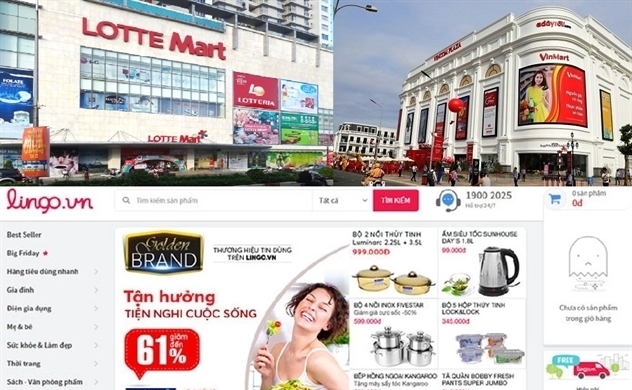E-commerce firms burn money in Vietnam’s potential market

Photo: Ha Linh
During the remaining days of 2019, Vietnam's e-commerce market has witnessed the departure of several popular e-commerce platforms.
Most recent, Korean multinational conglomerate Lotte has followed other players announcing the closure of its e-commerce website Lotte.vn. The company announced it would officially stop selling from February 20 next year and the site would be merged into Speedl.vn.
The move was part of its strategy for business restructure.
Earlier, Vietnamese conglomerate Vingroup announced it would merge e-commerce platform Adayroi into VinID.
Before Lotte and Vingroup’s announcement, Vietnam’s e-commerce market witnessed the withdrawals of several e-commerce websites including Robin.vn, Beyeu.com, Deca.vn, Lingo.vn ...
Just after exiting the market, IDG Ventures Vietnam, investor of Beyeu.com, left a message as saying: "e-commerce business needs a lot of money and several firms decided to stop burning money on this field. Good luck”.
The message reflects the actual situation of the market since e-commerce in Vietnam is seen as a war of burning money. Businesses without strong financial resources could quit the game earlier than others.
Order to operate an e-commerce platform, enterprise should have strong financial resources. Cash flow can be seen as blood nourishing the body. Investor needs a strategy for a long run, said Tran Trong Tuyen, General Secretary of Vietnam E-commerce Association.
Currently, traditional markets in Vietnam account for a high proportion with 60% while e-commerce and supermarket hold less than 40%. E-commerce platforms are facing fierce competition with other retail channels including Facebook, Zalo, Instagram, said Economist Dinh The Hien, adding enterprises have to invest huge amount of money into the market which is not large enough.
Vietnam has about 3 million Facebook fan pages among 70 million accounts. About 10% of them using Facebook for trading, the country has about 7 million Facebook traders. Social media could be strong competitors of e-commerce platforms, said Nguyen Phan Anh, an e-marketer expert.
High logistics cost is among challenges for e-commerce firms.
Currently, largest e-commerce firms in Vietnam are backed by foreign e-commerce corporations or firms with strong financial resources. Alibaba-backed Lazada has a capital injection of $4 billion. Tiki received capital contributions from VNG and JD.com while Shopee is a subsidiary of SEA, a Singaporean group backed by Tencent.
Total accumulated losses of Lazada, Shopee and Tiki in the period of 2015-18 was estimated at about $407 million. An e-commerce firm may suffer a loss of about $6.1 million every year if it wants to gain 1% market share in Vietnam, according to VNDIRECT Securities.
Shivam Agrawal, a former Amazon employee, wrote that e-commerce firms burn money they on marketing and promotions for the customer acquisition and keeping the cash flow running.
Report from E-Commerce and Digital Economy Department under Ministry of Industry and Trade shows that market size could reach $13 billion with the growth rate of 30% in 2020.
This scale will be higher than the target stated in the e-commerce development master plan for the 2016-2020 period.
► Vingroup quits retailing to focus on tech, industrial sectors
► South Korea’s Lotte to shut down Vietnam e-commerce website
Same category news
-
Huyen Hoang

 TIẾNG VIỆT
TIẾNG VIỆT 


















